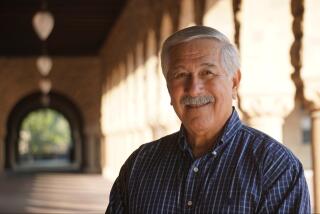PASSINGS: Oscar Espinosa Chepe, Alvaro Mutis Jaramillo, D.J.R. Bruckner
Oscar Espinosa Chepe
Cuban economist fell out with Castro
Oscar Espinosa Chepe, 72, a high-level Cuban economist and diplomat who broke with Fidel Castroâs government in the 1990s and was imprisoned for dissident activities, died Monday at a hospital near Madrid, where he had been undergoing treatment for chronic liver disease.
Espinosa was one of 75 writers and political activists locked up in 2003 during the Black Spring, a notorious crackdown on dissent that provoked international criticism and EU sanctions lasting five years.
Little known at the time of his imprisonment, Espinosa was sentenced to 20 years but released after 19 months on medical humanitarian grounds. By then his name was more familiar, in part thanks to the work of his wife, Miriam Leiva, who helped found the Ladies in White protest group to press for their husbandsâ release.
Espinosa was born Nov. 29, 1940, in the central province of Cienfuegos, and along with many of his generation, he was infused with revolutionary fervor after Fidel Castroâs 1959 Cuban Revolution.
He graduated with a degree in economics from the University of Havana in 1961 and began a long career of mid- and high-ranking posts in the government, including as counselor to then-Prime Minister Castro in the â60s and later as head of the powerful Office of Agrarian Reform.
He took a position at the National Bank of Cuba in the 1980s, but increasingly found himself at odds with government policy. According to Espinosaâs account, in the early 1990s, after voicing disagreement with the countryâs economic policies, he was denounced, publicly sanctioned and ultimately fired.
He reinvented himself as a writer about the Cuban economy, publishing articles and books in the United States, Spain and elsewhere. Espinosa argued that the Communist government wielded excessive control over the economy, and he was a strong critic of corruption and bureaucracy. He also vocally opposed the U.S. embargo and economic sanctions against the island, saying it gave the Cuban government an excuse for its shortcomings and the restrictions it placed on Cubans.
Alvaro Mutis Jaramillo
Popular Colombian writer
Alvaro Mutis Jaramillo, 90, a prolific Colombian writer and poet who enjoyed wide popularity outside his native land, died Sunday at a Mexico City hospital from a cardio-respiratory problem, according to Mexican media.
Critics said his work was distinguished by a rich and interesting mix of lyricism and narrative.
He started gaining popularity in 1986 with the publication of his first installment of his most famous work, âThe Adventures and Misadventures of Maqroll,â a collection of seven novellas about a wayward and quixotic sailor.
Mutis produced an extensive collection of novels, including âThe Manor of Araucaimaâ and âThe True Story of the Pied Piper of Hamelin,â and poetry that earned major international honors such as the Xavier Villaurrutia, Prince of Asturias and Cervantes prizes.
Born Aug. 25, 1923, in Bogota, Mutis was the son of a Colombian diplomat who served as ambassador to Belgium. In Colombia, the family had a coffee and sugar cane farm in Coello.
From that experience, Mutis developed a fascination with the sea, the tropics and the smell of coffee that marked his literary works.
His literary career began in 1948 with the publication of his first volume of poetry, âThe Balance,â followed in 1953 with âElements of the Disaster.â
Before winning fame as a writer, Mutis traveled to Mexico in 1956 with letters of recommendation from prominent Spanish filmmaker Luis Bunuel and Mexican television producer Luis de Llano Palmer and never left.
Three years after his arrival, he spent 15 months in Lecumberri prison in Mexico City, accused of embezzlement by the U.S. multinational Standard Oil Co. of New Jersey, where he worked as head of public relations.
He wrote âDiary of Lecumberri,â published in 1959, about his experience in the infamous lockup, which he called âa lesson I will never forget in the most intense and deep layers of pain and failure.â
D.J.R. Bruckner
Former Times columnist
D.J.R. Bruckner, 79, a syndicated political columnist for the Los Angeles Times in the late 1960s and early â70s who later became a book and theater critic for the New York Times, died Friday in Manhattan, the New York Times reported. He had cancer.
A Nebraska native, Donald Jerome Raphael Bruckner graduated from Creighton University and traveled to Oxford University as a Rhodes scholar. He was a reporter at the Chicago Sun-Times before opening the Los Angeles Timesâ Midwest bureau in Chicago in 1966. By 1969 he was national affairs columnist, then in 1972 left the newspaper to serve as vice president for public affairs at the University of Chicago.
Bruckner joined the New York Times as an editor of the book review in 1981 and wrote book, theater and film reviews for the paper until retiring in 2005.
Times staff and wire reports
More to Read
Start your day right
Sign up for Essential California for the L.A. Times biggest news, features and recommendations in your inbox six days a week.
You may occasionally receive promotional content from the Los Angeles Times.






